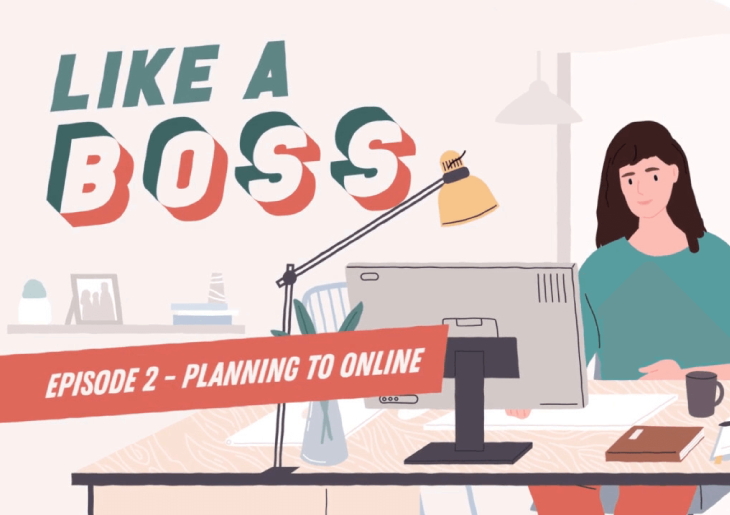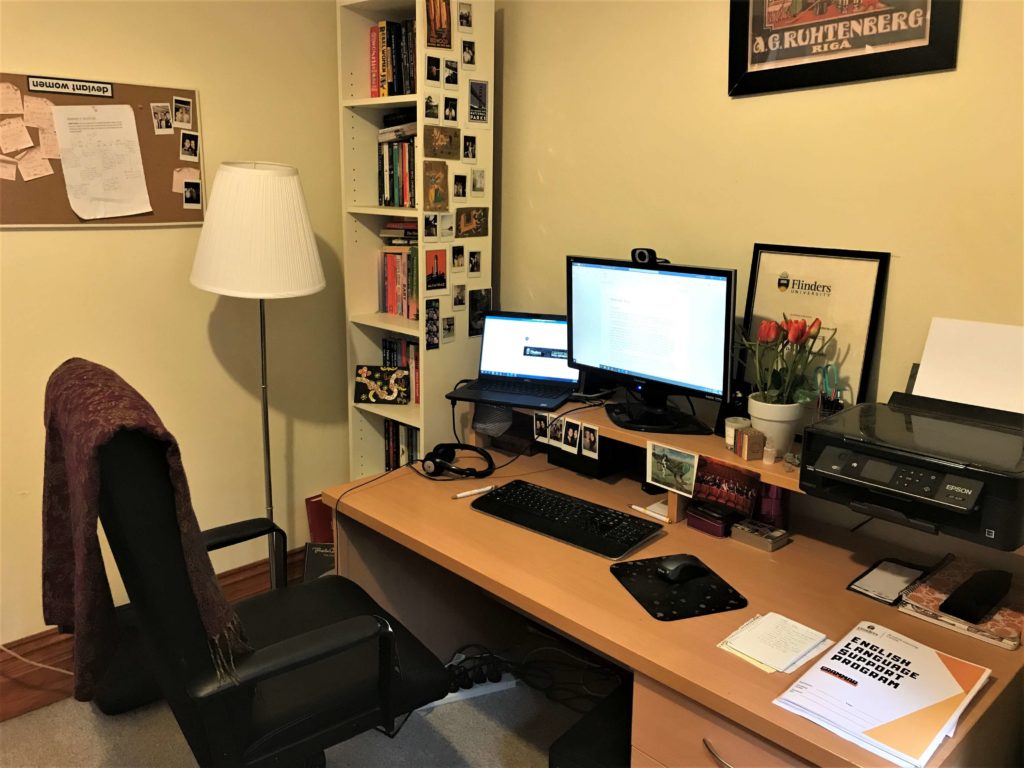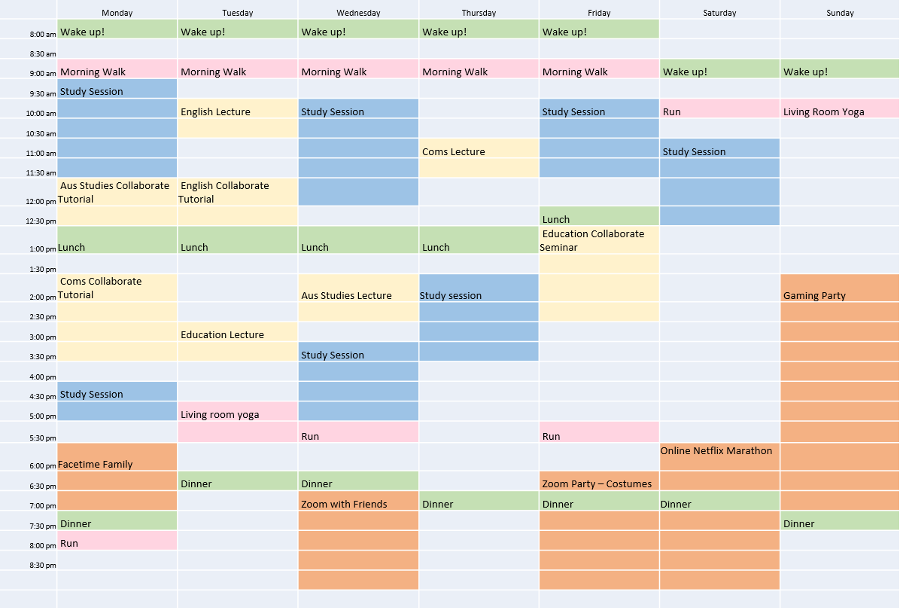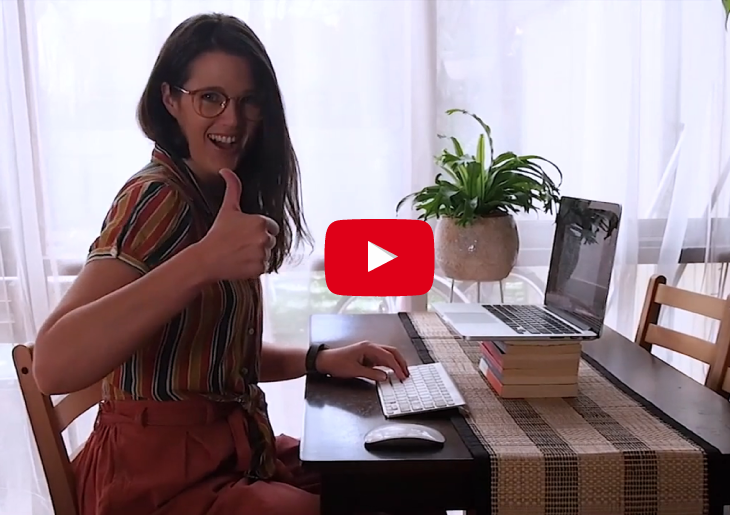
Planning to online … like a boss.
Hey everyone!
I hope your weeks have been … good? It feels like a weird thing to ask, doesn’t it? But I really do hope we’re all starting to adjust, even if it’s just by a bit. My current motto is to take things day by day, and so far it’s working for me. And I guess that’s also kind of what I’m here to talk to you about.
The online world is going to be the ‘new normal’ for a while and this means many of us have to change the way we operate on a day to day basis in quite a massive way.
You might be feeling like you’ve lost a sense of structure in your day which might mean you’re having trouble staying motivated and on task. You might find that your sleep patterns are out of whack, you’re feeling isolated or frustrated, and are worried about the pile of tasks that are building up. You might also have some practical concerns, such as how to find quiet space in your house to work, or how to connect to and access information online. Many of you are sharing your struggles and tips for dealing with this massive upheaval in online channels like Overheard at Flinders and in the Finding Your Way at Flinders discussion forums, and that’s excellent to see. Keeping those communication channels open and sharing our experiences is a really integral part of getting through this together!
So this is the first of a two-part vlog designed to give you some strategies that you can implement to help you get on top of this transition. Part one – this one – is going to discuss how to get organised and set up a routine, and part two is going to show you how to access and set up the tech and online tools that you might need.
So let’s get into it!
- Set up an effective learning environment
This can be difficult, as many of us live in environments that are not super conducive to study. You might have loud or disruptive housemates (partners, children and pets included!), a lack of physical space, or a million distracting things all around you, begging for your attention.
So how do we overcome this?
Research shows that designating one space as your study space helps your brain to kick into study mode. This might be a whole room, if you’re lucky enough to have a home office or spare bedroom, or it might be a dedicated space within another room.
As much as possible:
- Set up a desk (or table) and chair so that you maintain good posture. If you have a laptop, try to use an external keyboard and mouse if you can, and set the laptop up so that the height is at eyelevel and your elbows rest at a 90-degree angle.
- Ensure that your study space has adequate light. Natural lighting is best, if possible, and avoid glare on the screen.
- Arrange your study materials such as pens and notebooks so they’re close by and set up organised folders on your computer so that you can keep important files, such as topic materials, together.
- As much as you can, avoid studying from bed! Keep your study life and your home life as separate as possible, even though they now share a location. A sleep therapist once told me that bed is for the two S’s only – and study isn’t one of them!
- Once you’ve set up your space, try to minimise potential distractions as much as you can. If you’re in the living room, make sure the TV is turned off, close any irrelevant tabs on your browser, close the door (if you have one!) and if you work with music on, make sure it is something with as few lyrics as possible.
- Give your space some personality. We’re not robots! Try to keep it comfortable and fun without adding too many potential distractions.

- Know your anchor points
I stole this terminology from Dr Gareth who will be running a Collaborate session all about adapting to our new ‘ordinary day’ very soon – watch out for updates on that one!
The idea of anchor points is that we give ourselves clear and reliable times during the day that we associate with specific activities. Basically, we should think of our daily routine as a set of key moments. These might include:
- A wake-up time
- A moment when you set your goals and schedule for the day
- A few set study sessions
- Coffee/tea or snack breaks
- Exercise
- Meal times
- Scheduled class times
- A ‘clock-off’ time
- Bedtime
If we know our anchor points, we can use these to help us maintain a routine. Routine is super important when we work from home because it is far too easy to fall into bad habits. I’ve been trying to make sure I stick to my regular wake-up and sleep time so that I still show up at my desk showered, dressed and with relatively neat hair at 9am. I try to clock off as close to 5:30pm as I can (some days it’s easier than others!) and I try to make sure I have a half an hour lunch break outside, away from my computer. Even though my partner is also home (and currently very bored because he’s supposed to be on a cancelled placement and is a musician with no gigs to play!) he knows to leave me alone if my office door is shut, so my home life and work life stay as separate possible.
So here’s my routine and schedule check-list:
- Set an alarm (I know – don’t make that face at me)
- Shower and dress into something other than daytime pyjamas. Seriously, dressing for the day makes a big difference in your attitude to your work and maintaining a sense of normality!
- Block out dedicated study times (more detail about this below!)
- Set aside time for meaningful activities. We can still go outside for exercise, so a walk or a run will do you a world of good! Maybe living room floor yoga is your jam, or some backyard badminton …
- Make time for socialising. Social distancing is actually a terrible term. What we’re doing is physical It is more important now than ever to keep in touch with your loved ones. Take time to check in on friends, Facetime your mum, or host an MMO raid on Discord – whatever you’re into.
- Get Organised
Now let’s talk about how to make that routine work for us study-wise.
The first thing we want to do is consider how we can map the most important parts of our routine, such as lectures, online tutorials, study sessions, breaks and meaningful activities into an organised planner.
- Start by getting yourself a planner. What methods have worked for you in the past? Are you a diary person? An Outlook calendar junkie? You might like to consider:
- A daily planner
- A weekly planner
- A bullet journal
- A digital planner
- First, write down your online contact hours – Collaborate tutorials and lectures, for example.
- Second, include your important anchor points. Set aside time for meals, breaks, meaningful activities and online socialising.
- Notice where you have some free space and block out study sessions of about 2-3 hours.
Once you’ve done this, you’ll have a relatively structured day and, hopefully, a sense of routine. Remember you don’t have to be too rigid about this. Think of it as a guide. Also – be realistic with yourself. Don’t plan every single hour of the day. Flexibility is key!

- Make your study sessions goal oriented.
Now that you have your study sessions for the day planned out, we want to make the best use of them. I write myself a to-do list with clear goals every morning. I don’t know what I would do without it.
- Write a clear goal for each 2-3 hour study session. For example, ‘Finish topic readings’, or ‘draft English essay’.
- Then break it down even more. Divvy your study session up into a few short sprints. Research shows that 20 to 45-minute time intervals can maximise our attention and mental activity, if followed by a short break. This is called the Pomodoro method. Think of it like interval training. If you keep going flat out for too long, you’ll end up exhausted and throwing up in the bushes. Same with study – kind of. Our ability to retain information and concentrate diminishes over time, so it’s important to give your brain a rest.
- For each mini-session, write an even more specific goal. Eg, ‘Write introduction’, or ‘read methods section’.
Remember, what’s most important in all of this is that you find as system that works for you. We all work differently and have different home situations that we need to adapt to. However, at the same time, remember that creating a working from home schedule might feel uncomfortable at first. We’re all adjusting and adapting. And if you don’t keep to schedule, be kind to yourself. Try again tomorrow!
Remember that all the student services you’re used to still exist and can be found in the Flinders Support Network and the Flinders Online Hub is up and running.
If you’d like some extra tips about getting organised for online learning, I recommend checking out The Learning Scientists. They have some great resources and blogs about time management.
And, of course, keep up to date with Dr Gareth Furber’s Health and Wellbeing blog.
That’s all from me for this week. Next time we’re going to go through some important elements of embracing this new online world.
In the meantime, here’s my challenge for you this week. Remember how I said it’s important to still shower and dress for the day? I want to see your study outfits. What are you wearing to your Collaborate sessions? What makes you feel comfortable, but also like yourself? Post your pics in the Finding Your Way at Flinders FLO discussion board on in the comments section of the blog!
And tell us what has helped you adapt your schedule to work online. Have you got a new routine? What organisational system has worked for you?



Thank you again for the tips!